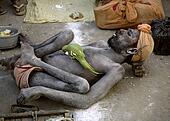
India has slipped three places to 87th spot in Transparency International's (TIs) latest Corruption Perception Index with financial scandals linked to the recently concluded Commonwealth Games contributing to this low rating in a survey of 178 countries.
"The perception about corruption in India seems to have increased primarily due to alleged corrupt practices in the Delhi Commonwealth Games," said the report by the Berlin-based global watchdog on corruption released in New Delhi last week.
With an 'integrity' score of 3.3 India was behind neighbouring China ranked at 78 based on the extent of corruption and their respective government's ability to punish and contain it. In 2009 India was in 84th place and China at 79.
A score of zero on a scale of 0-10 indicates the highest level of corruption and 10 the lowest.
"India has gone down in the (corruption) ranking as well as integrity score and this is a matter of concern and regret," TI India head P. S. Bawa said.
It appears that the level of governance has not improved despite India having a skilled set of administrators, he added.
The report, based on 13 surveys conducted throughout the year by various international bodies like the World Bank, the European Union and the International Monetary Fund also revealed that Denmark followed by New Zealand and Singapore, both of which were equally ranked, had the lowest levels of corruption.
In South Asia Bhutan was the best performer at 37th position with an integrity score of 5.7 whilst Nepal ranked 146th and Pakistan 143rd.
Afghanistan with an integrity score of 1.4 was ranked 176th, just two positions above Somalia and Myanmar.
Earlier, a TI survey conducted between November 2007 and January 2008 revealed that millions of Indians living below the poverty line, earning US$1 ($1.30) or less a day, had paid an estimated US$220 million in bribes over a three-month period to avail of basic public utility services.
The survey found that these bribes had been paid by the country's wretchedly poor for 11 types of services like police, healthcare, revenue and education.
The police were the most corrupt, with two out of every five people surveyed seeking its help for what was rightfully theirs through bribes.
Petty officials involved in maintaining land records occupied the second spot in the list of bribe takers.
The ambitious National Rural Employment Guarantee Scheme launched by Prime Minister Manmohan Singh's administration to alleviate poverty soon after it assumed office in 2004 too was plagued by corruption, the analysis stated.
Almost four million below poverty line households had to bribe staff in state-run hospitals to be admitted, allotted a bed and if required, referred to diagnostic services, the report said.
The total amount of bribes paid to hospital staff by these victims over a 12-month period was estimated at around US$21.75 million.
Nearly one million households were denied hospital services simply because they either refused to pay bribes or could not afford to do so.
And though primary and secondary education was the least corrupt arena, it was found that poor households had paid US$3 million in bribes to admit their children into school.
The study also showed that 5.36 million poor families had to dole out financial handouts or use a contact to avail of the government run public distribution scheme that provided them rice, wheat and cooking fuel like coal and paraffin at subsidised rates.
"The level and extent of mis-governance is horrifying in legal and moral terms," India's Vice-President Hamid Ansari had declared whilst releasing the report. Corruption he added was "pervasive and cancerous".
A "national bribe index" compiled some years ago by the weekly Outlook magazine found that Indians paid moneys for birth certificates, passports, ration cards, driving licences, electricity and water connections, for housing plans to be cleared and even for bank loans and for menial jobs.
A recent federal home ministry report largely corroborated this growing reality regarding corruption by declaring that crime syndicates with international connections had corrupted India's state machinery at all levels, virtually running a parallel government.
"All across India crime syndicates have become a law unto themselves making rules and ensuring that everyone obeys," the report stated.
Even in smaller towns and rural areas, musclemen and hired assassins controlled vast areas through terror and violence. The criminal justice system too had broken down, unable to deal with widespread chaos.
Many budding politicians became leaders of these gangs and over years, got themselves elected to local legislative bodies, state assemblies and even parliament.
"To survive in India today an individual either has to have influence or money or both," admitted a senior government official. Having neither meant trouble and a wretched existence.

No comments:
Post a Comment